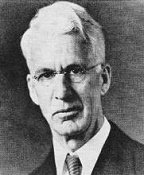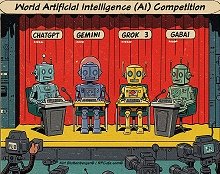Electronics Pioneers & History
- See Full List of AI Topics -

Albert Wallace Hull was born on April 19, 1880, in Southington, Connecticut,
to Charles Hull and Ellen Wallace Hull. His upbringing was shaped by a rural setting,
where he developed a strong work ethic and an early interest in scientific inquiry.
His childhood experiences in a small-town environment imbued him with a sense of
curiosity about the natural world, which would later fuel his passion for science
and engineering. He was one of several siblings, though details about his brothers
and sisters remain sparse in historical records.
Hull's academic journey began at the nearby public schools, where his aptitude
for mathematics and the sciences became evident. He pursued higher education at
Yale University, earning his Bachelor of Arts degree in 1902. At Yale, he developed
a keen interest in physics and chemistry, subjects that would lay the foundation
for his future innovations. He later completed a Ph.D. in physics at Yale in 1909,
focusing on crystallography and the emerging field of X-ray analysis, an area where
he would make groundbreaking contributions.
In his personal life, Hull married Frances Thurston, and the couple had three
children. The family lived in Schenectady, New York, where Hull spent the majority
of his career. He was a devoted family man, balancing his professional accomplishments
with his responsibilities as a husband and father.
Dr. Hull's professional career was defined by his work at General Electric, where
he joined the Research Laboratory in 1914. By 1928, he had risen to the position
of Assistant Director, a role he held until his retirement in 1949. His tenure at
GE was marked by an extraordinary output of innovative research and development.
Among his most significant contributions were the dynatron, the thyratron, and the
magnetron—devices that revolutionized high-power radio frequency generation and
had profound implications for telecommunications, radar, and industrial heating
technologies. Hull's magnetron, in particular, became a cornerstone of microwave
technology, paving the way for advancements in radar during World War II and the
development of modern microwave ovens.
Beyond his work in electronics, Hull was a pioneer in the analysis of crystal
structures using X-rays. This research earned him the prestigious Potts Medal from
the Franklin Institute in 1923. His contributions to vacuum tube technology were
recognized with the Liebman Prize in 1930, underscoring his status as a leader in
the field of electronics. During World War II, his expertise was instrumental in
the war effort, and he was honored with the Presidential Certificate of Merit for
his contributions to national defense.
Over the course of his career, Dr. Hull was awarded 94 patents, a testament to
his prolific inventiveness. He also authored or co-authored 72 technical publications,
sharing his insights and discoveries with the broader scientific community. His
work extended beyond the laboratory, influencing the development of technologies
that would shape the 20th century and beyond.
Albert W. Hull passed away on January 22, 1966, in Schenectady, New York, leaving
behind a legacy of innovation and scientific excellence. His contributions to physics,
engineering, and applied science continue to resonate, reflecting his enduring impact
on technology and industry.
 This content was generated by primarily
with the assistance of ChatGPT (OpenAI), and/or
Gemini (Google), and/or
Arya (GabAI), and/or Grok
(x.AI), and/or DeepSeek artificial intelligence
(AI) engines. Review was performed to help detect and correct any inaccuracies; however,
you are encouraged to verify the information yourself if it will be used for critical
applications. In all cases, multiple solicitations to the AI engine(s) was(were)
used to assimilate final content. Images and external hyperlinks have also been
added occasionally - especially on extensive treatises. Courts have ruled that AI-generated
content is not subject to copyright restrictions, but since I modify them, everything
here is protected by RF Cafe copyright. Many of the images are likewise generated
and modified. Your use of this data implies an agreement to hold totally harmless
Kirt Blattenberger, RF Cafe, and any and all of its assigns. Thank you. Here is
Gab AI in an iFrame. This content was generated by primarily
with the assistance of ChatGPT (OpenAI), and/or
Gemini (Google), and/or
Arya (GabAI), and/or Grok
(x.AI), and/or DeepSeek artificial intelligence
(AI) engines. Review was performed to help detect and correct any inaccuracies; however,
you are encouraged to verify the information yourself if it will be used for critical
applications. In all cases, multiple solicitations to the AI engine(s) was(were)
used to assimilate final content. Images and external hyperlinks have also been
added occasionally - especially on extensive treatises. Courts have ruled that AI-generated
content is not subject to copyright restrictions, but since I modify them, everything
here is protected by RF Cafe copyright. Many of the images are likewise generated
and modified. Your use of this data implies an agreement to hold totally harmless
Kirt Blattenberger, RF Cafe, and any and all of its assigns. Thank you. Here is
Gab AI in an iFrame.
AI Technical Trustability Update
While working on an update to my
RF Cafe Espresso Engineering Workbook project to add a couple calculators about
FM sidebands (available soon). The good news is that AI provided excellent VBA code
to generate a set of Bessel function
plots. The bad news is when I asked for a
table
showing at which modulation indices sidebands 0 (carrier) through 5 vanish,
none of the agents got it right. Some were really bad. The AI agents typically explain
their reason and method correctly, then go on to produces bad results. Even after
pointing out errors, subsequent results are still wrong. I do a lot of AI work
and see this often, even with subscribing to professional versions. I ultimately
generated the table myself. There is going to be a lot of inaccurate information
out there based on unverified AI queries, so beware.
Electronics & High Tech
Companies | Electronics &
Tech Publications | Electronics &
Tech Pioneers | Electronics &
Tech Principles |
Tech Standards Groups &
Industry Associations | Societal
Influences on Technology
|









